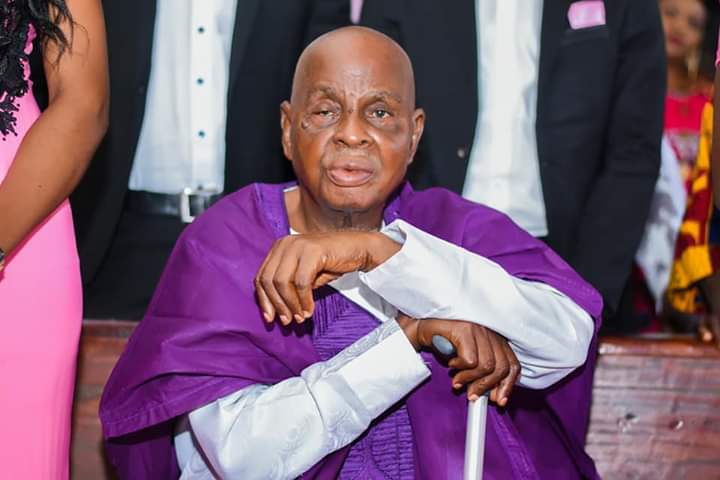He was a Dangote in his own right in spite of his name not being a big media name. Chief Augustine Igomu is not only one of the few Idoma men and women who never worked for government all his life, he also personifies the idea of private initiative or enterprise. Above all, he made a success of it. As with all other generalizations, this one too has its problems but it is nothing outrageous to say that most Idoma end up looking for and working for government till they retire into relative penury. It is not a natural attribute but something that reflects the political economy of the central Nigerian area which is dry of business opportunities relative to, say, Lagos, Portharcourt or Kano.
 In this case, you have someone who was already an actor in business in Kakuri, Kaduna in the 1970s. He was selling the Singer sewing machine through a linkage with the company. Someone who met him in that condition when he himself arrived Kaduna at the time told Intervention how surprised he was to find an Idoma man in that. The reason is that most of the Idoma in the urban centres across Nigeria in those days were either civil servants, soldiers, politicians, policemen or, in the case of Kaduna, in the textile industry. Take the police, for instance, that was where Iduh Ohene, lionized by the maestro, Joe Akatu, as a phenomenon no one trifled with, held court. Iduh Ohene did not hold court as an effant terrible but was simply so professional that he was highly regarded over and above his rank. The now late Eka Onojo attained such prominence too but he came later.
In this case, you have someone who was already an actor in business in Kakuri, Kaduna in the 1970s. He was selling the Singer sewing machine through a linkage with the company. Someone who met him in that condition when he himself arrived Kaduna at the time told Intervention how surprised he was to find an Idoma man in that. The reason is that most of the Idoma in the urban centres across Nigeria in those days were either civil servants, soldiers, politicians, policemen or, in the case of Kaduna, in the textile industry. Take the police, for instance, that was where Iduh Ohene, lionized by the maestro, Joe Akatu, as a phenomenon no one trifled with, held court. Iduh Ohene did not hold court as an effant terrible but was simply so professional that he was highly regarded over and above his rank. The now late Eka Onojo attained such prominence too but he came later.
Of course, the military had the Emmanuel Ikwues, Anthony Ochefu and the Obeyas. And Politics had, aside from the two ministers from Idomaland in the First Republic- JC Obande, Abutu Obekpa, the likes of Ameh Oodoh, the man who brought electricity to Otukpo by telling the late Sardauna “my people told me to told you that they want olatric in their divi-sion”. You may laugh at his grammar, calling electricity olatric but it produced the intended effect: the Sardauna personally came to switch on electricity in Otukpo as early as 1963, 15 years before Gboko got electricity. That is why he remains a legend even though it is debatable if he is given his due in Idomaland today. This Idoma presence in those spaces was not the case with business.

Walking away
But it was not only in Kaduna Chief Igomu showed business initiative. He replicated that on an even wider scale back in Ugbokolo, his hometown in Benue State. Although Otukpo is the most multicultural and most urban township in Idomaland, Ugbokolo has been a more qualitative semi-urban settlement. The speed may be damned too slow but there are commercial internet centres in Ugbokolo from where one could access one’s email should the situation arise. That would be a problem in Otukpo, including in some of its best hotels. Most business centres in Otukpo think everyone is a WAEC/GCE/JAMB/NECO candidate trying to follow the registration process associated with such examinations. The situation is sure to change with a federal university coming to Otukpo now but, till 2019, that was it.
Chief Augustine Igomu will share in the credit for Ugbokolo’s relative qualitative stature. He was one of the earliest landlords who built houses and rented to staff and students of Benue Polytechnic, Ugbokolo. There is the community service element in that in spite of the private initiative cast of mind behind it. The catering component of that mindset gave Ugbokolo a place anyone could eat original pounded yam with home touch in cooking. The rest were apologies until recently when newer places have opened.
The location of his hotel, ironically called Igomu Charity was most reeking of his private initiative boundedness. It was located strategically at the entry point into Ugbokolo main market. This was a main advantage especially on every Afo Market day when all manner of patrons came around. Of course, he combined everything with being a successful farmer, a referent in yam production and whatever advantage that conferred in a cultural space where the yam is the king. Being so business- minded and successful at it, he had no time for conflict. In fact, Intervention is authoritatively told that he was very straightforward and free of divisiveness.
For domesticating and demonstrating the ideology of private enterprise in a very dry axis of business such as Benue State, Chief Augustine deserves to be called the Dangote of Idomaland whose burial later this week is an apt moment to note that legacy. Of course, private enterprise has its own contributions, depending on how it is defined and controlled.




























